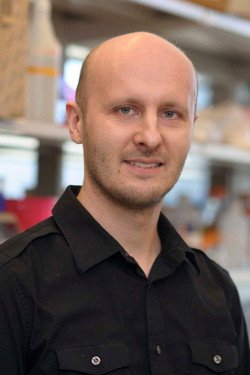Wilhelm Palm
2017 Regional Award Finalist — Post-Doc

Current Position:
Research Fellow
Institution:
Memorial Sloan Kettering Cancer Center
Discipline:
Biochemistry & Structural Biology

Current Position:
Research Fellow
Institution:
Memorial Sloan Kettering Cancer Center
Discipline:
Biochemistry & Structural Biology
Recognized for: Discovering a novel pathway that enables tumor cells to obtain nutrition
Areas of Research Interest and Expertise: Cell biology, Metabolism, Signaling, Cancer
Biography:
PhD, Biology, Max Planck Institute of Molecular Cell Biology and Genetics, Germany
MS, Biochemistry, Technical University of Munich, Germany
Dr. Palm performs research at the interface of biochemistry and cell biology and is broadly interested in the reciprocal relationship between metabolism and cell signaling – the signal transduction cascades by which cells regulate and coordinate their functions. The main focus of his research has been the question how cells can use proteins from their environment as a source of diverse nutrients. In this context, Dr. Palm has investigated nutrient-sensing signaling pathways that originated early in evolution in single-cell organisms to coordinate cell behavior with nutrient supply, as well as signaling pathways that emerged in animals to coordinate the behavior of different cells within the organism.
Dr. Palm’s postdoctoral research seeks to uncover the ways in which cells can take up proteins from the outside, break them down into their constituent amino acids, and then use those amino acids to build new proteins as needed. He found that when cells recover amino acids from ingested proteins, as happens when there are no free amino acids to use instead, cell proliferation is suppressed by a specific nutrient-sensing pathway, known as the mTORC1 pathway. Thus, mTORC1 couples growth to the availability of free extracellular amino acids. As mTOR inhibitors are increasingly investigated in cancer treatment, Dr. Palm’s work may have implications for the use of these therapeutics.
“I think in 20-30 years we will understand cellular metabolism as a complex machine that transforms nutrients into specific amounts of biomass and energy. Understanding its regulatory circuits will then allow us to compute metabolic outputs of different cellular states that depend for instance on nutrition or therapeutic intervention.”
Homepage:
https://www.mskcc.org/research-areas/labs/members/wilhelm-palm
Key Publications:
Other Honors:
Tri-Institutional Breakout Prize for Junior Investigators 2017
Genentech Fellowship of the Hope Funds for Cancer Research 2015
EMBO Long-Term Fellowship 2014
PhD Fellowship of the German National Academic Foundation 2008
Jürgen Manchot Award of the Technical University of Munich 2008
Scholarship of the German Chemical Industry Association 2002
Undergraduate Scholarship of the German National Academic Foundation 2002
In the Media:
https://www.mskcc.org/blog/targeted-therapy-may-enable-some-cells-grow